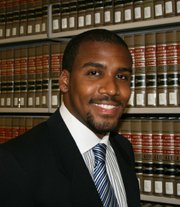WASHINGTON, D.C. — As a weirdly eared, lanky, southern Methodist who graduated from a Catholic school in Madison, Miss., my belief is that religion, whether you are Jewish, Muslim, Catholic or Buddhist, plays a significant role in molding a person’s morality in the right direction. The unification of our nation is derived, in part, from a common sense of morality and what it entails. As history proves, the absence of universal morality can lead to different forms of tyranny and oppression. With that stated, the idea and practice of religious freedom is an exceptional constitutional right, but it is also a phenomenon.
Throughout human history, people have been tortured, beaten and killed in the name of religion. If an individual spoke against a powerful religious sect, that person would be lynched in the middle of the public square. Thomas Jefferson and other Founding Fathers knew of this brutal history. This is why our Founding Fathers, whom the Tea Party and the “religious right” fictitiously attempt to emulate, made it essential to build an indestructible wall that separated our church and state.
Needless to say, these provisions were drafted more than 200 years ago. Since then, there has been a myriad of state and federal legislation attempting to bridge the gap between church and state. If these legislative acts are formally implemented, they are usually followed by a wave of state and federal court cases challenging said legislation through judicial action.
Potential legislation such as Mississippi’s “Religious Freedom Restoration Act," SB2681, seems to be another hubris attempt by certain factions of the “religious right” to knock down the wall the Founding Fathers constructed between church from state. The Mississippi bill says the state cannot “burden” a person’s right to exercise religion. It states: “'Burden’ means any action that directly or indirectly constrains, inhibits, curtails or denies the exercise of religion by any person or compels any action contrary to a person's exercise of religion.”
Does the language in the bill seem overbroad and confusing? Don’t worry, I consider myself a constitutional enthusiast, and I, too, noticed myself scratching the top of my head while reading the legislative language. This bill essentially stems from the same vein as the controversial Arizona bill, which Arizona Gov. Jan Brewer recently vetoed. The Arizona bill would have allowed businesses to turn away gays and lesbians based on claims of sincerely held religious beliefs. Supporters of the bill argued it would protect “religious freedom.” But opponents saw it as sweeping discrimination that would harm various communities. The Mississippi “Religious Freedom Restoration Act” offers the same avenues for discrimination, except unlike the Arizona bill that only applied to private parties, the Mississippi bill appears limited to government actions.
On its surface, Religious Freedom Restoration Act appears to harmlessly promote an individual's religious right. But similar to an iceberg, the body of the bill is latent through a form of legislative rhetoric. The body essentially hands out a license to discriminate. The prevailing view among most advocacy groups is that this bill, just like its sister bill that was birthed and ultimately killed in Arizona through outside political pressures, will more than likely target the lesbian, gay, bisexual and transgender (LGBT) community.
These groups are essentially being targeted because of the overwhelming momentum the LGBT community is enjoying by obtaining their basic fundamental rights that are provided for everyone else. This audacious attempt by the “religious right” to impede the success gained by the LGBT community by combining their religious views with our legislative process is both sinister and heinous. President John F. Kennedy echoed similar sentiments in his famous speech to Baptist ministers in Houston, Texas, in 1960. As Kennedy was seeking an anomalistic feat by attempting to become the first Catholic president of the United States, he confidently proclaimed: “Faith is not allowed in the public square. I will keep it separate.”
Leaders such as Presidents Kennedy and Jefferson foretold that the unification of church and government would ironically unify no one and leave only a license to discriminate. And with that license, the dominant religious sect would have the potential to not only discriminate against other religions but against other groups and/or individuals who may disagree with their religious practices and beliefs.
Thomas Jefferson once stated, “Millions of innocent men, women and children, since the introduction of Christianity, have been burnt, tortured, fined and imprisoned; yet we have not advanced one inch towards uniformity.” As a country occupied with many religions, doctrines and lifestyles, we have advanced past that inch toward uniformity by sharing one common goal, which is to enhance the society we share as Americans and not to enhance just Catholics, Muslims or weirdly ear-shaped lanky Southern Methodists from Mississippi.
Leslie B. McLemore II Esq. is a Jackson, Miss., native, who currently resides in Washington, D.C. He is a proud graduate of Jackson State University, North Carolina Central University School of Law (J.D.) and American University Washington College of Law (LL.M.).



Comments